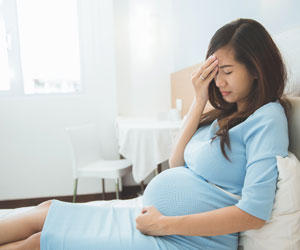
One of my pregnant patients sat in my office earlier this week and wondered aloud if she was depressed. She reported feeling tired, felt physically lethargic, had trouble sleeping, had appetite changes, and her libido had decreased. If she hadn’t been pregnant, I likely would have agreed with her and we would have had a discussion about the most effective ways to treat depressive symptoms. But the fact is, the symptoms of pregnancy and the symptoms of depression can look a lot alike. I had to spend a fair amount of time talking with her, trying to tease apart her pregnancy symptoms versus the possibility of them stemming instead from depression. We concluded together that she wasn’t depressed. She looked forward to events in her life, she felt strongly attached to her partner, family and friends, she didn’t feel alone, and she felt very hopeful about the future.
But what would I have recommended if in fact she had been experiencing symptoms of depression? It certainly would not have been the same conversation I would have had five years ago. At that point in time, if one of my pregnant patients was not immediately responding to the kind of therapy I practice (cognitive behavior therapy, or CBT), I would have been pretty casual about referring her to a psychiatrist or psychiatrist nurse practitioner to be prescribed the most effective antidepressant medication. But things have changed in the past five years, at least in my practice.
There are many women experiencing depression during pregnancy who do need to be taking antidepressant medication. They are ones who had a history of disabling depressive symptoms, who may have struggled with suicidal thoughts or other plans to hurt themselves, who can’t function or live a normal life unless they take medication. And these women need to be under the care of a perinatal psychiatrist or nurse practitioner who can carefully evaluate them, discuss the risk/benefit ratio of the various medications, and prescribe the medication which has the most potential to keep them safe and healthy while minimizing the risks to their baby.
But that is not the case for most pregnant women. For someone who is already on medication, it makes sense to evaluate why she went on the medication in the first place. Does she have the same life circumstances? Does she have more social support now? Or less? Is her life more challenging? Or less? Has she ever tried to go off her medication before, and if so, what was the outcome? If she hasn’t tried, is she willing to do so, with lots of other coping and support approaches in place?
For many pregnant women who are experiencing symptoms of depression, it makes sense to sit down with a mental health professional and go over the risk/benefit ratio about taking medication. There can be significant benefits, such as a lessening of depression in a few weeks, but there can also be risks. Taking the most common class of antidepressants, SSRIs, is associated with some increased risks during pregnancy, including miscarriage, preterm birth, newborn behavioral syndrome, developmental delays in the baby, and the potential for more serious issues later in life, including autism. The majority of women who take SSRIs during pregnancy have healthy babies, but there are enough risks to warrant a serious conversation.
Unless someone is experiencing severe symptoms of depression, including suicidal ideation or an unacceptable quality of life, my preference is to try other approaches first. CBT has been shown to be highly effective in relieving symptoms of depression, as good as or in some studies, more effective than medication. Exercise is also highly effective in decreasing depressive symptoms. Other approaches include light therapy and even partner massage.
If you are pregnant and are wondering if you are depressed, or if you are already taking medication for your depression, talk to your obstetrician or nurse midwife about the best way for your symptoms to be treated. A few weeks of CBT, a daily walking routine, or a nightly massage might be all it takes for you to be in a happier place as you await the birth of your baby.


I’m 35 week pregnant nd last USG test my baby weight 1734 grm and seen cord of loop around neck I’m little worried.. plz help me